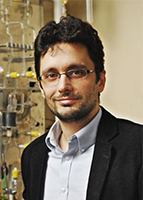Time: September 28th, 2017, 10:00-11:00am
Venue: No.1 Conference Room at Energy Building Conference Center
Lecturer: József S. Pap MTA Centre for Energy Research Surface Chemistry and Catalysis Department

Abstract:
The wide access to the energy accumulated for millions of years in non-renewable fossil carriers has fundamentally shaped the human civilization. Chemical energy carriers such as H2 represent a reasonable alternative for the continuation of the flexible supply of our needs now tuned towards renewable energy sources. Catalysts for the electrolysis of water (e.g., H2 production), which utilize abundant first row transition metals, especially those that promote the more demanding oxygen evolving reaction (OER, also known as water oxidation catalysts, WOCs), are highly pursued. Notwithstanding of the direct advantages of heterogeneous systems based on inorganic precursors, molecular WOCs formed with organic ligands also attract peculiar attention. These molecular systems can either change dynamically leading to in-situ formed compounds with characteristic activity, or exhibit remarkably long-lived molecular catalysis. In accordance with their central role in each scenario, the investigation and understanding of the pH-dependent behaviour, stability and redox properties of the various metal–ligand combinations should be continual goals.
We contributed to this field by studying versatile metallopeptide systems with special focus on copper. Inspiration comes from the natural polypeptides that serve as the chassis of most metalloenzymes. These compounds not only form flexible pockets around the active sites thus helping substrate docking, but also efficiently ligate metal ions through various donor groups and influence their redox properties.
My presentation focuses on new metal coordination options created by artificial peptide branching. In the past years we could achieve a substantial progress in the control of the stability and WOC performance of our copper-branched peptide complexes. Moreover, the molecular catalysts could be layered onto electrodes with polyelectrolytes that allowed operando surface studies. The key to all targeted modifications was the modular design of this new ligand family.
Introduction:
József S. Pap has been leading the Surface Chemistry and Catalysis Department of the MTA Centre for Energy Research in Budapest since 2013. Born in 1977, Hungary. Earned MSc (2001) and PhD degree in chemistry (2005, enzyme modeling systems) at the University of Veszprém, Hungary. Worked in Poland (University of Wroc?aw, with Prof. Henryk Henryk Koz?owski), Germany (MPI für Bioanorganische Chemie, with Prof. Karl Wieghardt) and the USA (University of Wisconsin - Madison, with John F. Berry). Between 2009 and 2013 worked at the University of Pannonia on model compounds for oxidase and oxygenase metalloenzymes. His current topic is water splitting by bio-inspired electrocatalysts related to renewable chemical energy storage.
Contact: GE Rile DNL2005
Phone: 84379711